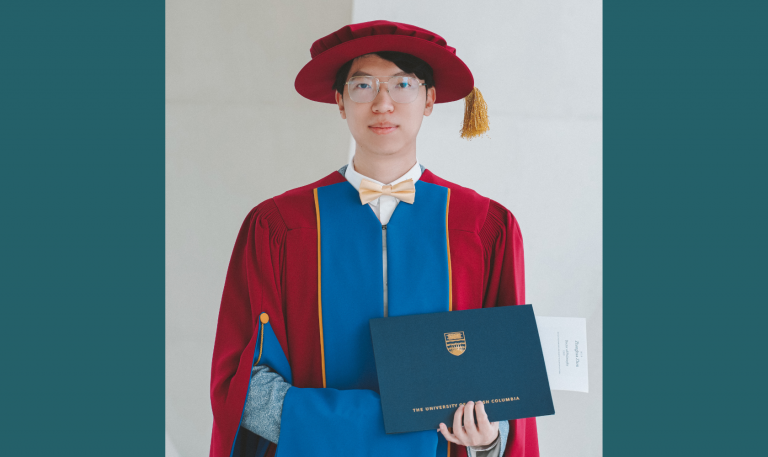
Sebastian Zhou is a PhD alumni from our UBC Electrical and Computer Engineering department and part of UBC’s System-on-a-Chip Research Lab.
Sebastian’s PhD research focused on the optimization of System-on-a-Chip global routing techniques, and he has worked on projects developing routability-driven routing strategies. Prior to becoming a doctoral student, Sebastian worked as a Research and Development Engineer at Blackcomb Design Automation, where he designed and developed algorithms to improve hardware repairability. He has also worked as a Research and Development Technical Intern at Synopsys Inc. Sebastian was part of the PrimeTime team, helping to develop one of the best timing signoff solutions in the industry.
Sebastian joins us in an interview where he shares how he became interested in System-on-a-Chip and what excites him about his work, suggestions he would give to his younger self, as well as his talents for go-karting!
Your work mainly focuses on System on a Chip (SoC) global routing techniques. How did you get started studying this topic?
It was the start of the second year of my PhD program- I had just finished all my coursework and felt every bit of myself ready to dive into the world of research. I started working part-time at a local Electronic Design Automation (EDA) company in Vancouver. During this period, I realized that there are so many real-world problems waiting to be optimized, and there is so much room for improvement in SoC global routing. Therefore, it was at that moment I decided to dedicate my Ph.D. life to it.
Why is it important to study SoC? What future impacts could this research have?
Studying how to design better SoCs is very crucial for improving our everyday lives. Let’s think about the things that we can’t live without nowadays like cellphones and computers. They all have chips in them. Even the microwave has chips. I would argue that SoC is the foundation that supports modern human civilization. My research finds ways to accelerate the SoC production while ensuring chips are as powerful as they can be, so that (hopefully) people may get their hands on new iPhones even more frequently.
What aspects of this research did you find most exciting?
During my research, I have developed an encoding/decoding algorithm that bridges the gap between academic and industrial data formats. This algorithm enables me to work on the real chips. So, when I first saw the positive results from my experiments that my work brings to the “real world products,” I felt excited, as if I had changed the world. Of course, this conceit didn’t last long as I recovered my rationality after a good night’s sleep.
If you could go back in time and meet yourself at the start of your Ph.D., what is some advice you would give your past self?
Be more prepared, both mentally and physically. Doing a Ph.D. is nothing like doing a master’s or bachelor’s program. You will encounter hardships that no one has experienced, which means you have no one to talk to when you are down. You will face failures that you have to spend night after night solving, which means you don’t get to sleep. And even if you are in bed, you can’t sleep at all – so just be prepared. However, there are many online mental health resources that helped me throughout my degree.
You also work as a Professional Development TA Facilitator for the Faculty of Applied Science. Why is student learning important to you?
Having a good student learning atmosphere is definitely essential. I’ve been there since I was a first-time TA. I didn’t know what a TA should do, or how I should do it. I felt helpless. Although it didn’t take long to get on the right track, the experience wasn’t actually pleasant for both the students and me. I don’t want the same thing to happen to others. Therefore as a senior, I became a TA facilitator to get new TAs ready by sharing my own experience and real teaching scenarios.
Getting a Ph.D. can get pretty intense, what are your favourite things to do to unwind?
I find myself adventurous when it comes to off-work life. To get away from intensive work, I love to do intensive sports. I drive the go-kart regularly, and I am relatively competitive in this sport. By ‘relatively’ I mean I am usually the best in every day drop-in racings, and I get into the top 10 weekly rankings. However, when it comes to the prized competition and things are getting very serious with my studies, I become just a participant rather than a competitor. Now that I have graduated, maybe it’s time for me to get that trophy!
Where do you hope you’ll be in 5 years?
In 5 years, I hope that I am still working in this field, either in academia or industry. I want to proudly say to the world that some product has my work embedded in it, and that it has been benefiting the world in many aspects.
